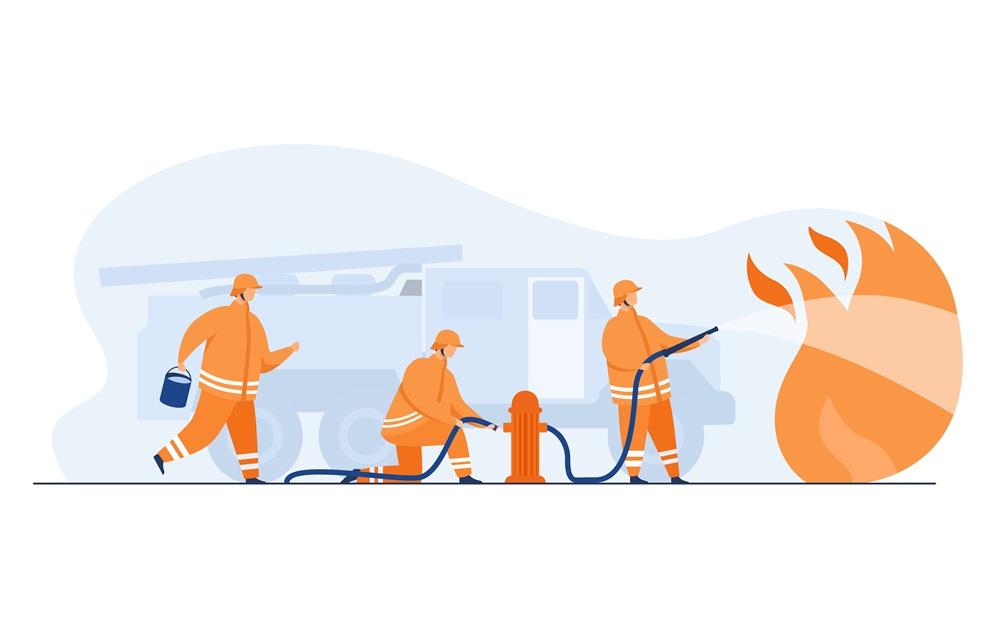Fire safety and prevention policy template
Supporting information
Our Fire Safety and Prevention Policy ensures a secure workplace, mitigating risks and safeguarding employees and assets.
Fire safety and prevention policy
1 Overview
1.1 This Fire Safety and Prevention Policy outlines the measures and responsibilities necessary to prevent fire-related incidents and ensure the safety of all employees, visitors, and contractors within the workplace.
1.2 The policy aims to minimise fire risks through regular maintenance, employee training, and adherence to fire safety regulations, thereby creating a secure and compliant work environment.
2 Scope
2.1 This policy applies to all employees, contractors, visitors, and any other individuals present on company premises.
2.2 It encompasses all company-owned or leased buildings and vehicles, and includes guidelines for fire prevention, emergency response procedures, the use of fire safety equipment, regular fire drills, and mandatory compliance with relevant fire safety laws and standards.
3 General Principles
3.1 Introduction and Aims
3.1.1 At [Company Name], our foremost priority is to safeguard the well-being of our employees by minimising fire-related risks. This is achieved through robust measures to prevent fires and effective procedures for minimising fire outbreaks and safely evacuating the premises.
3.2 Fire Safety Management
3.2.1 Key duties include:
-
Conducting regular risk assessments to minimise fire hazards.
-
Ensuring comprehensive staff training on fire safety procedures.
-
Developing an emergency plan and prominently displaying fire notices.
-
Conducting routine fire drills.
-
Checking and maintaining fire-fighting apparatus.
-
Implementing recommendations from the Fire Risk Assessment.
-
Regular consultations with the Fire Risk Assessment officer for safety matters.
-
Conducting routine fire safety inspections and documenting findings.
-
Periodic informal checks to bolster safety measures.
-
Ensuring unobstructed and functional fire escape routes and exit doors.
-
Regular checks and maintenance of fire detection and protection systems.
-
Maintenance of an updated Fire Safety Log Book.
3.3 Fire Procedures
Clear fire procedure notices are displayed at strategic points. Responsibilities and persons accountable
You're previewing 30% of this document. For instant full access, purchase this item or a parent bundle.
What is this for?
This Fire Safety and Prevention Policy Template serves as a comprehensive guide for organisations to establish robust fire safety protocols within their premises. This template provides a structured framework outlining essential procedures, safety measures, and responsibilities necessary to prevent, prepare for, and respond to fire-related emergencies. It offers a customisable and adaptable policy foundation that aligns with legal requirements while allowing tailored implementation to suit specific workplace environments.
This template encompasses various crucial elements, including fire prevention strategies, evacuation plans, fire equipment usage guidelines, and staff training protocols. It enables organisations to create a detailed policy that addresses potential fire hazards, educates employees on safety protocols, and designates roles and responsibilities during fire emergencies. By offering a structured framework, this template facilitates the creation of a comprehensive fire safety policy tailored to each organisation's unique needs, ensuring a proactive approach to fire prevention and preparedness.
Utilising our Fire Safety and Prevention Policy Template empowers organisations to establish a proactive fire safety culture, fostering a safe and secure working environment for employees, visitors, and assets. It serves as a foundational document guiding the implementation of fire safety measures, compliance with regulations, and the development of effective emergency response procedures. This template not only aids in mitigating fire risks but also supports the cultivation of a vigilant and well-prepared workforce committed to ensuring the safety and protection of all within the workplace.

Employment law compliance
-
Regulatory Reform (Fire Safety) Order 2005: Sets out duties for employers to ensure fire safety in non-domestic premises, requiring a written fire safety policy.
-
Health and Safety at Work Act 1974: Imposes a general duty on employers to ensure the health, safety, and welfare of employees, including fire safety provisions and risk assessments.
-
Management of Health and Safety at Work Regulations 1999: Requires employers to assess risks to employees' health and safety, encompassing fire hazards and prevention measures.
-
Building Regulations 2010 (England and Wales): Outlines specific requirements for fire safety measures in the design and construction of buildings.
-
The Fire (Scotland) Act 2005 and The Fire Safety (Scotland) Regulations 2006: Legislation specific to Scotland, detailing requirements for fire safety policies and risk assessments.
Documentation sequence
Fire risk assessment form template
Our Fire Risk Assessment identifies vulnerabilities, ensuring safety protocols align with potential hazards, minimising risks for all.
